Redditor Complains About Pet Store's 'Treat Stocking Policies' Because Her Dog Has Severe Dietary Restrictions
It is a privilege, a joy, and a responsibility to own a dog. It's one of the most significant decisions any person can make; that commitment comes with a lot of responsibility that dog owners always take seriously.
Dog owners are encouraged to teach their dogs early on how to behave appropriately. Those who allow their dogs to acquire bad habits often have to deal with them constantly.
Your dog needs to understand that they must adapt to each situation because if they don't, it can lead to terrible consequences. Each dog owner is responsible for their dog's behavior, and they need to ensure they keep them under control at all times.
Dog owners eventually become familiar with their pets' different patterns. They should be able to predict incidents before they happen and do their best to prevent them.
A Redditor who goes by the username u/SR17740 made a post on the r/AmItheA**hole subreddit, where she explained how her dog has severe dietary restrictions and was dangerously close to all the treats in the pet store. The user complained about their treat-stocking policies but was unsure whether she was justified in doing so.
Here's the original post by Reddit user u/SR17740:
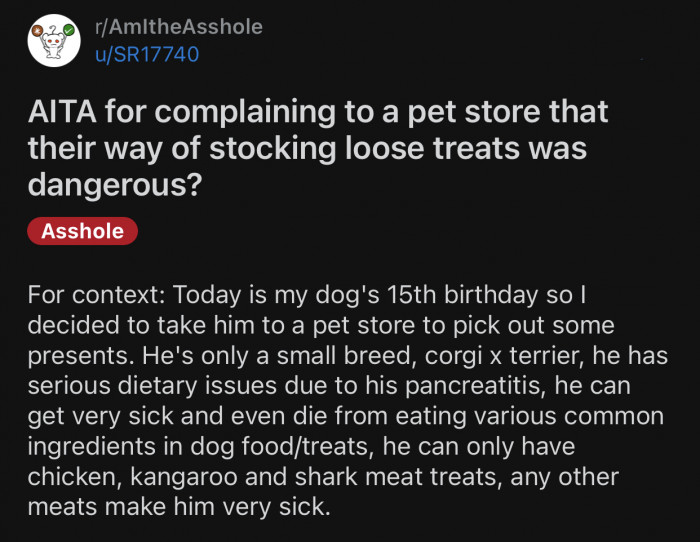
The pet store had loose pet treats, so OP kept a very close eye on her dog.

The treats are displayed in a way that dogs can easily reach out and grab them.

The Importance of Understanding Pet Needs
This situation emphasizes the critical need for pet owners to understand their pets' dietary restrictions and health requirements.
Research published in the Journal of Animal Science highlights that many pets require specialized diets to maintain their health, which can complicate their care in various environments.
Failing to accommodate these needs can lead to serious health consequences, highlighting the responsibility pet owners carry.
Understanding Pet Ownership Responsibilities
Pet ownership comes with significant responsibilities that can be overwhelming, especially when dietary restrictions are involved. According to Dr. John Paul Scott, a leading researcher in animal behavior, understanding a pet’s needs is crucial for their well-being. When pet owners feel unsupported by stores or services, it can lead to frustration and feelings of helplessness.
This scenario illustrates how important it is for businesses to recognize and accommodate the unique needs of pet owners, particularly those with pets that have special dietary requirements.
OP was unsure whether she had the right to complain, so she decided to ask the Reddit community.

OP modified the post to include an "Edit" with more context.
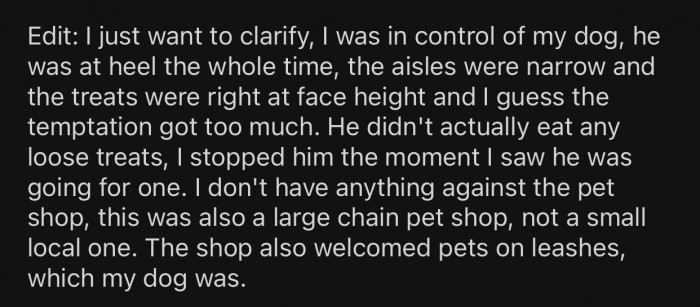
OP eventually added a second "Edit" to address some things mentioned in the comments.

When businesses neglect the specific needs of pet owners, it can create unnecessary stress and anxiety for caregivers.
According to studies in consumer psychology, a lack of awareness of diverse consumer needs can lead to dissatisfaction and distrust.
Pet stores that do not consider the dietary restrictions of animals may alienate responsible pet owners, impacting their business success.
Research in consumer psychology highlights how a lack of understanding from service providers can lead to dissatisfaction and conflict. When pet owners feel that their concerns are not taken seriously, it can erode trust and loyalty towards the business. Establishing clear communication channels where consumers can express their needs can foster a more supportive environment.
To address these issues, pet stores can benefit from training staff on the importance of dietary restrictions and how to engage with pet owners empathetically.
Here's how the Reddit community reacted to u/SR17740's post:
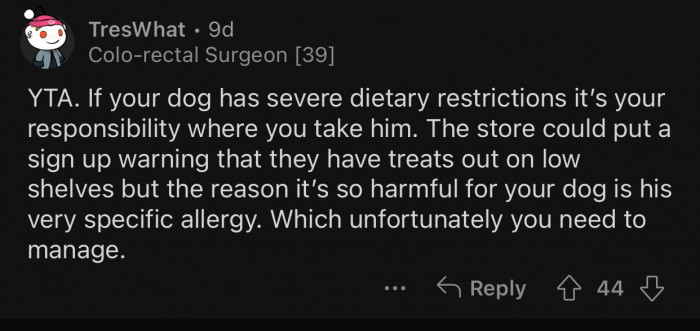
Pet owners should keep their pets under control at all times.

If you lose control at any time, you are responsible for whatever happens.
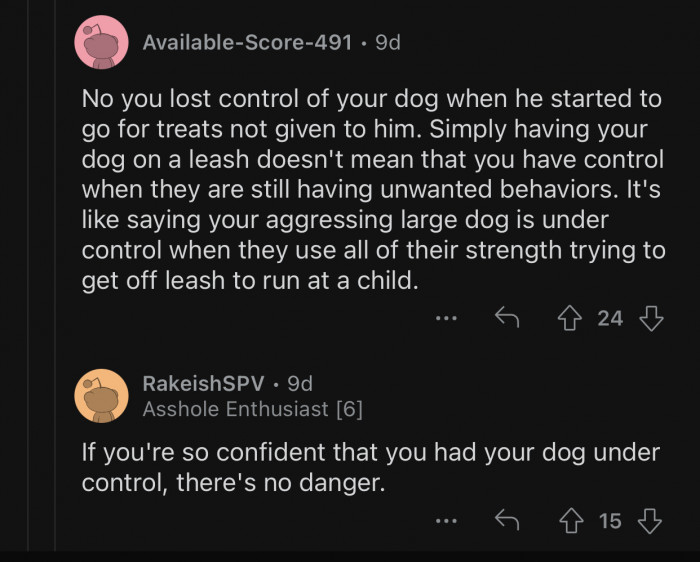
Understanding Consumer Rights and Responsibilities
Pet owners have both rights and responsibilities when it comes to their pets' care.
Research indicates that consumers are increasingly aware of the ethical implications of pet ownership, including appropriate care and nutrition.
Ensuring that pets receive proper care reflects not only on the owner but also on the businesses that provide pet products.
The Importance of Advocacy in Pet Care
Pet owners often find themselves in the position of advocating for their pets' needs, a concept supported by research in advocacy psychology. Effective advocacy involves not only understanding one’s needs but also communicating those needs clearly and assertively. Studies show that individuals who advocate effectively for their needs often experience greater satisfaction in their relationships and interactions.
In this case, the pet owner could benefit from developing advocacy skills, such as assertive communication and knowledge about their pet's dietary requirements, to effectively convey their concerns to the pet store.
OP claims that she had her dog under control at all times.
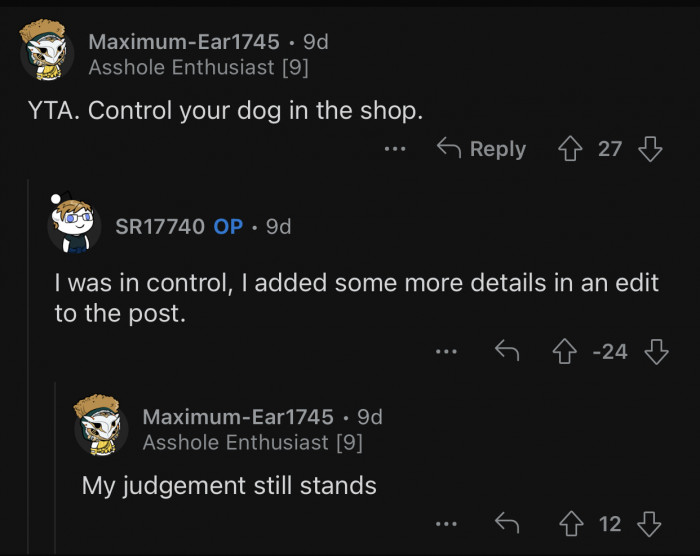
It's not their fault if your dog has any allergies.
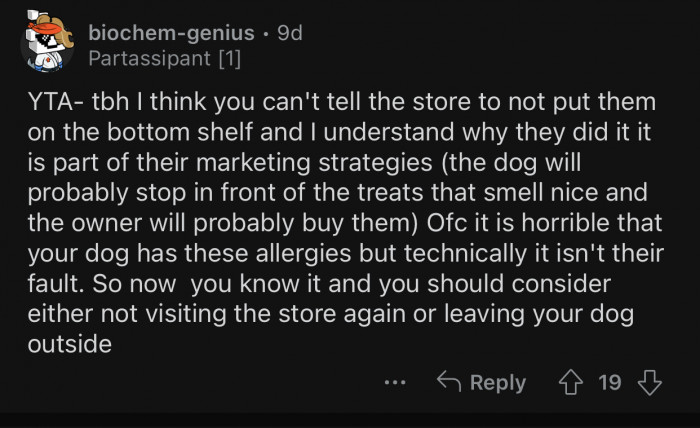
OP didn't take the necessary precautions to ensure her dog didn't get to the treats.
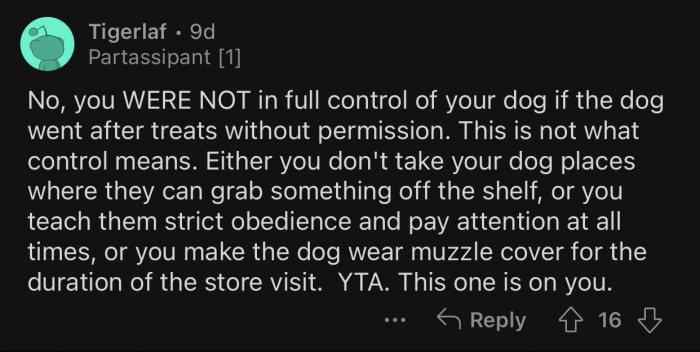
For pet owners facing similar challenges, advocating for clearer labeling and policies in pet stores can be beneficial.
Research shows that when consumers voice their concerns, businesses often respond positively, leading to improved practices.
Additionally, seeking out specialized pet supply stores that prioritize animal health can alleviate some of the stress associated with dietary restrictions.
Behavioral strategies, such as role-playing or practicing discussions about dietary restrictions with friends or family, can enhance confidence in advocating for one's pet. Additionally, joining pet owner support groups can provide valuable resources and emotional support, helping owners navigate the complexities of pet care.
Overall, fostering a community that values open dialogue and understanding can empower pet owners, promoting better practices in pet care and supporting healthier relationships between consumers and businesses.
The store welcomes pets and their owners.
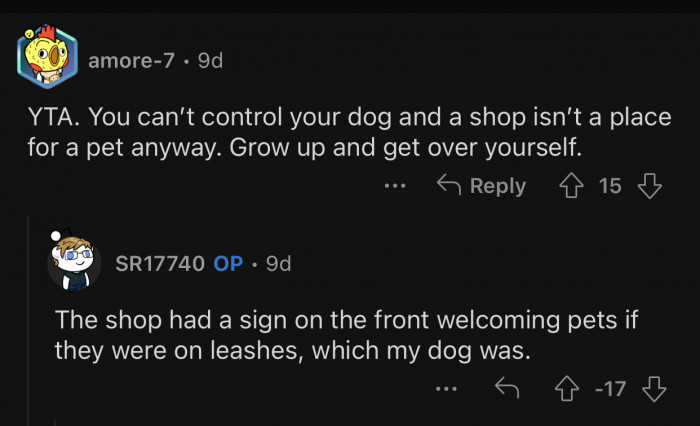
The store is not responsible for your dog eating their treats.

"Stop expecting other people to cater to your whims."
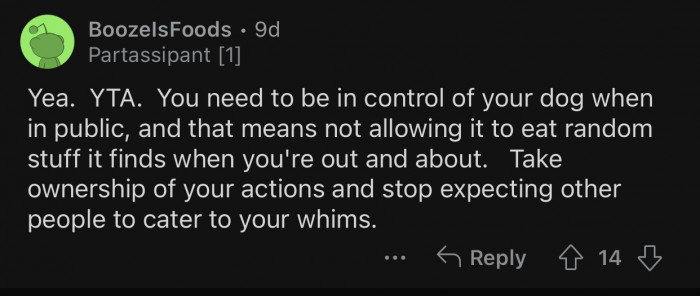
The Role of Communication in Animal Care
Effective communication between pet owners and pet supply retailers is crucial for ensuring the well-being of animals.
Studies in veterinary psychology reveal that clear communication regarding pets' needs can improve health outcomes and enhance the shopping experience.
Encouraging a dialogue about dietary needs can lead to better products and services tailored to specific pet requirements.
If the dog was under control, OP didn't have anything to complain about.

It's a ridiculous thing to complain about.

"An owner should be able to recognize and understand their pet’s limitations."
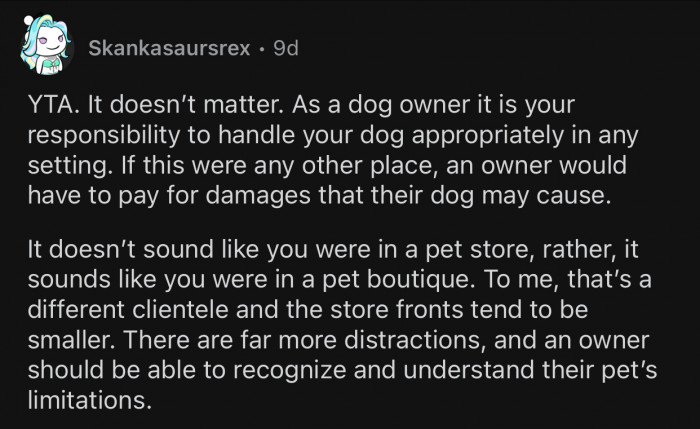
Engaging with community resources, such as local veterinarians or pet care groups, can provide additional support for pet owners.
Research indicates that community involvement enhances awareness regarding proper animal care and fosters a supportive network for pet owners.
Establishing these connections can empower owners to make informed decisions regarding their pets' health.
It's OP's responsibility to train her pet.
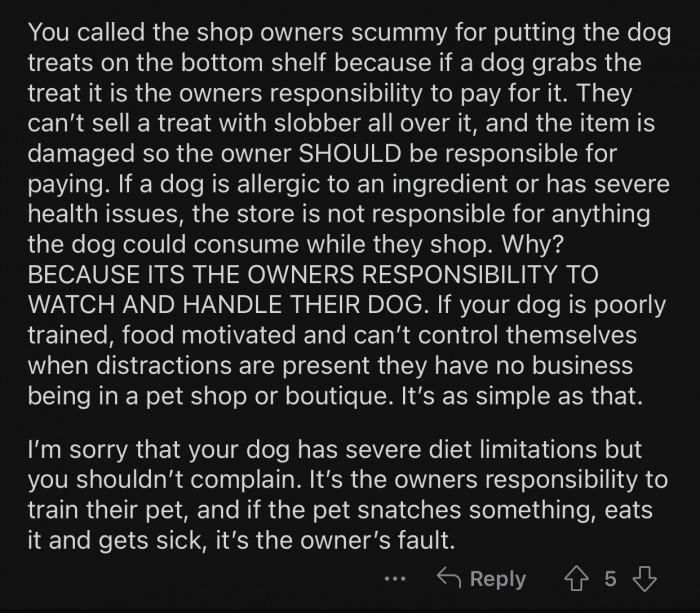
OP should know if her dog can handle it or not.

OP is quite entitled.
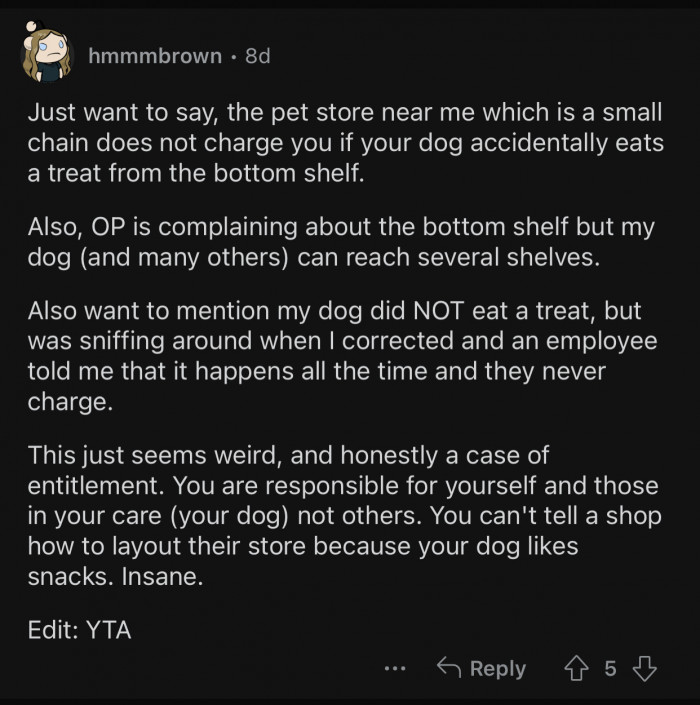
Navigating the Challenges of Pet Ownership
Pet ownership comes with a unique set of challenges, particularly when it comes to health and dietary needs.
Understanding these challenges is essential for providing the best care for pets and ensuring owners feel supported.
Research suggests that education and resources can play a pivotal role in improving the overall quality of life for pets and their owners.
Well, this was an interesting story. OP doesn't have the right to complain.
The store is not responsible for the way pets behave; only the owner is responsible for that. OP should train her dog to behave better in such situations.
If you enjoyed reading this, make sure to check out similar content on our platform.
Psychological Analysis
This situation reflects the challenges many pet owners face when their needs are not acknowledged by service providers. The frustration expressed by the pet owner underscores the importance of effective communication and understanding in pet care. Encouraging businesses to prioritize education and empathy can significantly improve the experiences of pet owners.
Analysis generated by AI
Analysis & Alternative Approaches
Insights from consumer psychology and advocacy highlight the complexities of pet ownership and the importance of understanding dietary needs. Research consistently shows that effective communication between pet owners and service providers can enhance satisfaction and foster loyalty.
By prioritizing advocacy and understanding, businesses can create a more supportive environment for pet owners, ultimately benefiting both parties.
Analysis & Alternative Approaches
Ultimately, understanding the needs of pets is crucial for responsible ownership and care.
Research indicates that when pet owners are informed and proactive, they can significantly enhance their pets' quality of life.
By fostering open communication and advocating for better practices, pet owners can create a safer and more supportive environment for their pets.



